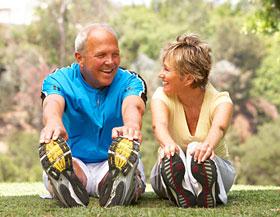If one thing's for certain, it's that there's never enough money to take care of all the needs of older adults. That holds true on the local, state and federal level, and costs, as they always have, only go up.
While there's no way to completely avoid the costs associated with the social and medical needs of adults as they age, there is an effective way to substantially reduce them by shortening the period in one's life when they're needed.
And that way is staying physically active – in whatever way – for as long as possible.
In order for that to happen, as a society we have to invert the debilitating mindset that's so pervasive in America, one which gives older adults permission to accept that "I'm getting older, so I better stop being active and start getting used to slowing down."
Clearly, we have it all wrong – and it's time to understand that it's not getting older that stops one from being active, but it's that being inactive accelerates the process of getting old.
That's the position being expressed by a group of British doctors and researchers, whose analysis on the subject was published Tuesday in the BMJ. It's not a new concept, they say, but it bears repeating as often as necessary until attitudes change where embracing a more active lifestyle is the norm, not the exception.
"The effects of ageing and of loss of fitness are commonly confused. The loss of ability that results from inactivity may lead to a person requiring social care," writes Scarlett McNally, an orthopaedic surgeon, and her colleagues, in their analysis titled, Focus on physical activity can help avoid unnecessary social care. "Exercise may reverse the decline and keep a person above the threshold for needing increased care."
No one's being expected to start running marathons, or becoming a fixture in the gym lifting weights. Beneficial activity can be a varied as embracing "walking groups, gardening, cooking clubs, and volunteering," which according to the authors, "have all been shown to improve the health and wellbeing of people at all ages with long term conditions."
 As we've heard previously from many sources, while also repeated here, do not sit for too long. Get up and walk. Keep engaging in some kind of exercise – even light exercise, that tests arm and leg muscles – as often as possible. Pass on the elevator whenever it's feasible and climb a flight or two of stairs. All of these minor movements can combine to deliver meaningful results, and long-term health benefits.
As we've heard previously from many sources, while also repeated here, do not sit for too long. Get up and walk. Keep engaging in some kind of exercise – even light exercise, that tests arm and leg muscles – as often as possible. Pass on the elevator whenever it's feasible and climb a flight or two of stairs. All of these minor movements can combine to deliver meaningful results, and long-term health benefits.
In 2015, the UK National Institute for Health and Care Excellence stated, the authors noted, that “disability, dementia and frailty can be prevented or delayed,” but that, "This remarkable statement received little publicity at the time." Which is why McNally et al are making the case again, especially as older populations around the world continue to grow.
"We need individuals to understand their role in reducing demand for social care by being active," they write. "The gap between the best possible level of ability and actual ability can be reduced at any age," and it "may not only restore the person to the ability they enjoyed 10 years earlier, it may make the crucial difference between living well at home or being dependent on social care or residential care."




